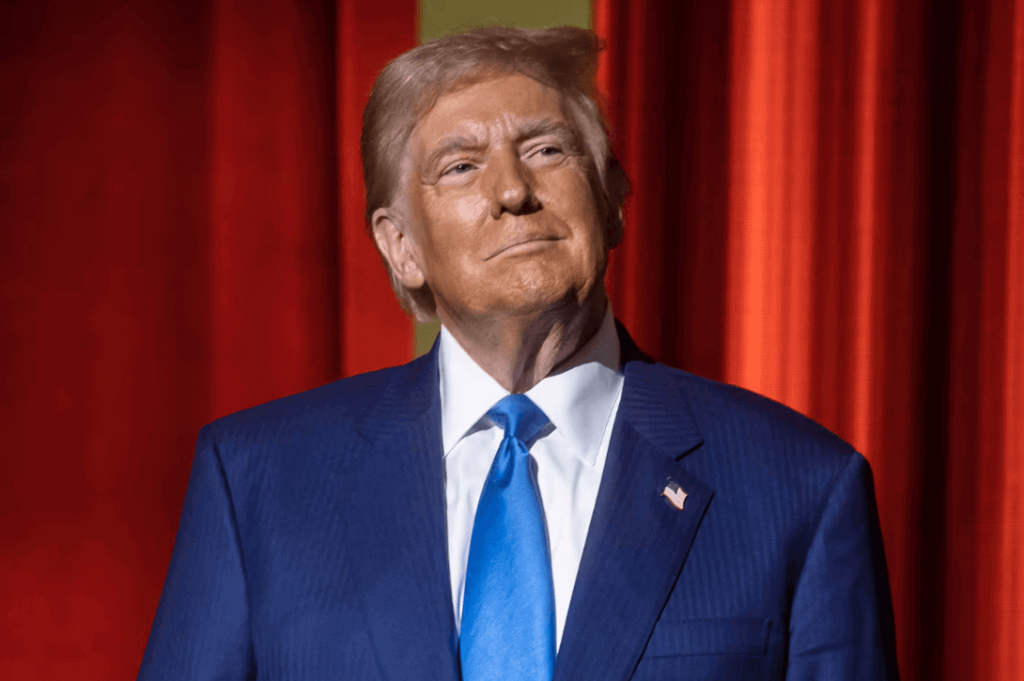【中美创新时报2024 年 12 月 9 日编译讯】(记者温友平编译)当选总统唐纳德·特朗普在周日播出的一次采访中概述了开启第二任期的激进计划,誓言立即采取行动打击移民并赦免他最暴力的支持者,同时威胁要关押利兹·切尼等政治对手。《纽约时报》记者彼得·贝克对此作了下述报道。
特朗普在连任后的首次坐下来接受广播网络采访时表示,下个月新政府上任第一天,他将对 2021 年 1 月 6 日冲进国会大厦的数百名支持者实行赦免,并试图禁止移民父母在美国出生的孩子自动获得公民身份。
特朗普还表示,他将解雇联邦调查局局长克里斯托弗·雷,因为他“闯入了我的家”,而且他最初并不确定特朗普在今年的一次暗杀企图中受伤是被子弹还是弹片击中,但他没有给出具体的时间框架。他还表示,调查特朗普在 1 月 6 日袭击事件中所扮演角色的国会议员应该被关进监狱。
“老实说,他们应该为他们所做的事坐牢,”特朗普在谈到代表怀俄明州的共和党人切尼和调查袭击事件的众议院两党委员会的其他成员时说道。在 NBC 的“与媒体见面”节目中,特朗普与克里斯汀·韦尔克交谈时表示,他不会指示新任司法部长或联邦调查局局长追查此事,但他表示希望他们自己去做。“我认为他们必须考虑这个问题,”他说,“但我不会”命令他们这么做。
与此同时,特朗普似乎暗示,他不会像他曾经发誓的那样,任命特别顾问调查拜登总统及其家人。他还暗示,他不会在其他几个问题上采取最强硬的立场,称他不会寻求解雇美联储主席或限制堕胎药的供应。尽管他发誓要结束出生公民权,但特朗普表示,他将努力与民主党合作,让那些儿时非法入境的移民(被称为梦想者)免于被驱逐出境。
当被问及调查拜登及其家人时,特朗普说:“我真的希望我们的国家取得成功。我不想回到过去。我希望让我们的国家取得成功。报应将通过成功来实现。”
特朗普试图淡化人们对卡什·帕特尔 (Kash Patel) 的担忧,帕特尔是他计划提名的极右翼忠诚分子,负责接管联邦调查局。帕特尔发誓要“追捕”当选总统的敌人,并在 2023 年出版的一本书的附录中列出了大约 60 名他认为是“行政部门深层政府成员”的人。
当被问及帕特尔是否会对政治对手进行调查时,特朗普说:“不,我不这么认为。”但新任总统对此持开放态度。“如果他们是骗子,如果他们做错了什么,如果他们违反了法律,那很可能,”他说。“他们追捕我。你知道,他们追捕我,而我没有做错什么。”
特朗普没有解释他认为 1 月 6 日委员会成员可能犯了什么罪行。他发表此番言论之际,拜登的高级助手正在辩论他是否应该在离任前向切尼等引起当选总统愤怒的人发布全面赦免令。拜登和他的团队越来越担心,选择帕特尔表明特朗普将兑现他对那些反对他的人“报复”的威胁。
为了任命帕特尔,特朗普必须解雇雷,根据一项旨在避免联邦调查局政治化的法律,雷的任期为 10 年。雷最初由特朗普于 2017 年任命,但这位当选总统明确表示,他个人对雷感到不满,因为联邦调查局于 2022 年搜查了他在佛罗里达州的庄园海湖庄园,以寻找他离开白宫后不当带走的机密文件,尽管搜查令得到了法官的批准。
“我不能说我对他感到兴奋,”特朗普说。“他入侵了我的家。我要为此起诉这个国家。他入侵了海湖庄园。我对他的所作所为非常不满。”
他还引用了雷在 7 月暗杀企图后的评论,称最初并不清楚特朗普是被子弹还是弹片击中。“当我耳朵中枪时,他说,‘哦,也许是弹片,’”特朗普说。“弹片是从哪里来的?它是从天堂来的吗?我不这么认为。”
特朗普没有明确表示他会解雇雷,但他对此毫不怀疑。“如果卡什上任,他将会取代某人的位置,这似乎相当明显,对吧?”他说。
不过,他还表示,他不打算解雇美联储主席杰罗姆·鲍威尔,他是另一位特朗普任命的、令他失望的人。“不,我不这么认为,”特朗普说。“我看不出来。”
这位当选总统表示,上任第一天,他将签署一系列有关经济、能源和边境问题的行政命令。采访中提到的两个具体内容是赦免 1 月 6 日袭击者,并取消在美国出生的儿童的出生公民权。
当被问及他是否会赦免“所有”袭击国会大厦的人时,特朗普说:“是的。但我将迅速采取行动。”在追问下,他补充道:“第一天。”
至于出生公民权,特朗普表示,他将试图推翻宪法保障的出生在美国的人都是公民,无论其父母的身份如何。大多数法律学者表示,总统无权推翻第十四修正案保障的公民权,该修正案规定“所有在美国出生的人都是美国公民”。
特朗普没有说明他将如何推进,以及他是否会通过行政行动来推翻对修正案的普遍解释,而这肯定会受到法庭的质疑。他没有明确表示他必须修改宪法,但这不太可能发生,因为这需要召开制宪会议,或获得国会两院三分之二的支持以及四分之三的州的批准。
“我们必须改变它,”特朗普说。“我们可能不得不回到人民手中。但我们必须结束它。”
他一再谎称“我们是唯一拥有这种权利的国家”。事实上,《世界人口评论》列出了其他 34 个拥有不受限制的出生公民权的国家和地区,包括加拿大和墨西哥。
但特朗普表示,他将寻找一种方法让所谓的梦想家留在美国。“我们必须对梦想家采取一些措施,因为这些人很小就被带到这里,”他说。“其中许多人现在已经是中年人了。他们甚至不会说自己国家的语言。是的,我们会对梦想者们采取行动。”
他说他将“与民主党合作制定计划”,并指责他们没有保护梦想者。但事实上,正是奥巴马总统在 2012 年首次采取行政行动,通过一项名为“童年入境暂缓遣返”(DACA)的政策,使大约 70 万梦想者免于被驱逐出境。
相比之下,特朗普试图撤销该政策,认为它违宪,但被最高法院以程序为由阻止。
本文最初发表于《纽约时报》。
题图:当选总统唐纳德·特朗普。戴夫·桑德斯/纽约时报
附原英文报道:
Trump signals an aggressive opening, threatening ‘jail’ for Cheney and others
By Peter Baker New York Times,Updated December 8, 2024
President-elect Donald Trump.DAVE SANDERS/NYT
WASHINGTON — President-elect Donald Trump outlined an aggressive plan for opening his second term in an interview that aired Sunday, vowing to move immediately to crack down on immigration and pardon his most violent supporters while threatening to lock up political foes such as Liz Cheney.
In his first sit-down broadcast network interview since being reelected, Trump said that on Day 1 of his new administration next month, he would extend clemency to the hundreds of his backers who stormed the Capitol on Jan. 6, 2021, and try to bar automatic citizenship for children born in the United States to immigrant parents.
Without indicating a time frame, Trump also indicated that he would fire FBI Director Christopher Wray, out of personal pique because “he invaded my home” and was insufficiently certain at first whether Trump’s wound during an assassination attempt this year was caused by a bullet or shrapnel. And he said that members of Congress who investigated his role in the Jan. 6 attack should be thrown behind bars.
“For what they did, honestly, they should go to jail,” Trump said of Cheney, a Republican who represented Wyoming, and the rest of the bipartisan House committee that looked into the attack. Speaking with Kristen Welker on “Meet the Press” on NBC, he said he would not direct his new attorney general or FBI director to pursue the matter but indicated that he expected them to do it on their own. “I think that they’ll have to look at that,” he said, “but I’m not going to” order them to.
At the same time, Trump seemed to signal that he would not appoint a special counsel to investigate President Biden and his family, as he once vowed. And he signaled that he would not take the most assertive position on several other issues, saying that he would not seek to fire the chairperson of the Federal Reserve or restrict the availability of abortion pills. And although he vowed to end birthright citizenship, Trump said he would try to work with Democrats to spare immigrants brought to the country illegally as children, known as Dreamers, from deportation.
“I’m really looking to make our country successful,” Trump said when asked about investigating Biden and his family. “I’m not looking to go back into the past. I’m looking to make our country successful. Retribution will be through success.”
Trump sought to downplay fears of Kash Patel, a far-right loyalist he plans to nominate to take over the FBI, who has vowed to “come after” the president-elect’s perceived enemies and named about 60 people he considered “members of the executive branch deep state” as the appendix to a 2023 book.
“No, I don’t think so,” Trump said when asked if Patel would pursue investigations against political adversaries. But the incoming president left the door open to it. “If they were crooked, if they did something wrong, if they have broken the law, probably,” he said. “They went after me. You know, they went after me, and I did nothing wrong.”
Trump offered no explanation of what crimes he thought the members of the Jan. 6 committee might have committed. His comments came as Biden’s top aides are debating whether he should issue blanket pardons before leaving office to people such as Cheney who have drawn the president-elect’s ire. Biden and his team have grown increasingly concerned that the selection of Patel indicates that Trump will follow through on his threats of “retribution” against those who have crossed him.
To install Patel, Trump would have to fire Wray, who has a 10-year term under a law meant to avoid politicizing the FBI. Wray was originally appointed by Trump in 2017, but the president-elect made clear he was personally aggrieved against him for the FBI search of his Florida estate, Mar-a-Lago, in 2022 for classified documents that he had improperly taken after leaving the White House, even though the search warrant was approved by a judge.
“I can’t say I’m thrilled with him,” Trump said. “He invaded my home. I’m suing the country over it. He invaded Mar-a-Lago. I’m very unhappy with the things he’s done.”
He also cited Wray’s comment after the assassination attempt in July that it was not initially clear whether Trump was hit by a bullet or shrapnel. “When I was shot in the ear, he said, ‘Oh, maybe it was shrapnel,’ ” Trump said. “Where’s the shrapnel coming from? Is it coming from — is it coming from heaven? I don’t think so.”
Trump did not explicitly say he would fire Wray, but he left little doubt about it. “It would sort of seem pretty obvious that if Kash gets in, he’s going to be taking somebody’s place, right?” he said.
He also said, however, that he does not plan to fire Jerome Powell, chairperson of the Federal Reserve and another Trump appointee with whom he has grown disenchanted. “No, I don’t think so,” Trump said. “I don’t see it.”
The president-elect said that on his first day in office, he would sign a raft of executive actions on the economy, energy and the border. Two specifics that came up during the interview were issuing pardons for Jan. 6 attackers and ending birthright citizenship for children born in the United States.
Asked if he would pardon “everyone” who attacked the Capitol, Trump said, “Yeah. But I’m going to be acting very quickly.” Pressed, he added, “First day.”
As for birthright citizenship, Trump said he would try to reverse the constitutional guarantee that anyone born in the United States is a citizen regardless of the status of their parents. Most legal scholars have said the president has no power to overturn the right to citizenship guaranteed by the 14th Amendment, which says that “all persons born” in the United States “are citizens of the United States.”
Trump was vague about how he would proceed and whether he would seek to reverse the common interpretation of the amendment through executive action that would surely be challenged in the courts. He left open the idea that he would instead have to amend the Constitution, which would be unlikely to happen since it would require either a constitutional convention or the support of two-thirds of both houses of Congress and the approval of three-quarters of the states.
“We’re going to have to get it changed,” Trump said. “We’ll maybe have to go back to the people. But we have to end it.”
He repeatedly said falsely that “we’re the only country that has it.” In fact, the World Population Review lists 34 other countries and territories that also have unrestricted birthright citizenship, including Canada and Mexico.
But Trump suggested that he would look for a way to keep the so-called Dreamers in the country. “We have to do something about the Dreamers because these are people that have been brought here at a very young age,” he said. “And many of these are middle-aged people now. They don’t even speak the language of their country. And yes, we’re going to do something about the Dreamers.”
He said he would “work with the Democrats on a plan” and blamed them for not protecting Dreamers. But in fact, it was President Barack Obama who first took executive action in 2012 to spare about 700,000 Dreamers from deportation through a policy called Deferred Action for Childhood Arrivals, or DACA.
Trump, by contrast, tried to rescind the policy, arguing that it was unconstitutional, only to be blocked by the Supreme Court on procedural grounds.
This article originally appeared in The New York Times.

